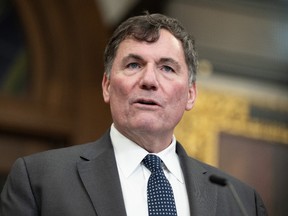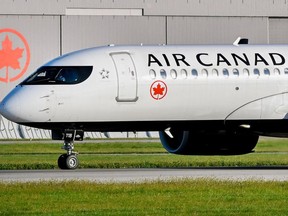The commissioner didn’t provide specifics on what the RCMP asked for, but said the national force has contingency plans in place for any potential surges
Article content
OTTAWA — RCMP Commissioner Mike Duheme says he has outlined the number of officers needed to increase security at the Canada-U.S. Border to Public Safety Minister Dominic LeBlanc, who opposition parties pressed on Tuesday to detail the Liberals’ plan.
Article content
Article content
Speaking to reporters, Duheme said he has presented the government with a plan when it comes to bolstering the country’s border security.
Advertisement 2
Article content
“Numbers have been discussed with the minister,” Duheme said, after appearing before the parliamentary committee on public safety, along with heads of other security agencies.
He declined to provide specifics on what the RCMP has asked for, but said the national force has contingency plans in place for any potential surges across the almost 9,000-kilometre land border and has discussed what resources would be needed from the government.
Duheme referenced how the force is prepared to redeploy resources, citing how it pulled officers from Montreal to respond to the number of people crossing into Canada through Quebec’s Roxham Road, which has since been closed.
Sending cadets currently in training to become RCMP officers from its depot facility in Regina to the border could be another option, he said, telling reporters afterward how the force did so in the months following the 2014 shooting on Parliament Hill to bolster the police presence.
Following Prime Minister Justin Trudeau’s trip last Friday to dine with U.S. president-elect Donald Trump and several of his cabinet picks for the White House, LeBlanc, who was also in attendance, has pledged that the federal government will provide additional resources in the form of helicopters and drones to the RCMP to increase border security.
Article content
Advertisement 3
Article content
Additional personnel would also be part of that plan, which the Liberals are finalizing, LeBlanc said.
“You can appreciate that if we’re asking for new technology, we need the resource to operate that technology,” Duheme told reporters afterwards.
“There’s an increase in uniform presence that we want, but there’s also that increase on people that can operate the technology that we’re going to get.”
The minister is “well in tune of some of the challenges and they’re being addressed,” Duheme said. “I’m looking forward to the investment.”
The RCMP is responsible for policing the border between official entry points, while the Canada Border Services Agency is in charge of protecting official ports of entry.
In the light of the renewed attention on border security, the union representing border services officers has called on LeBlanc to reconsider that divide, saying it was time to expand the agency’s mandate.
Doing so would require rescinding a 1932 order that made the RCMP responsible for policing between points of entry, where individuals illegally cross the border.
Advertisement 4
Article content
“(Canada Border Services Agency) officers are already trained with the border in mind and have a keen understanding of relevant laws and regulations,” Customs and Immigration Union President Mark Weber, wrote in a letter to LeBlanc.
“They are also already physically present at areas of importance.”
Weber also told the National Post in an interview the situation is frustrating for members because if officers see someone crossing the border near a port “we have to call the RCMP.”
Federal NDP Leader Jagmeet Singh echoed the union’s call, saying the Liberals have failed to address the staffing shortages the agency has faced for years.
“We need to immediately hire 1,100 (Canada Border Services Agency) officers just to get back to the level where we can actually do the minimum required, and then look at hiring more officers to do a better job of protecting Canadians,” he told reporters following a briefing with other opposition leaders by Trudeau after his dinner with Trump.
“This is not just about making sure we prevent the trade tariffs that could hurt us directly, but it’s also in our interest to do this,” Singh said, citing the numbers of drugs and guns that cross into Canada illegally.
Advertisement 5
Article content
Erin O’Gorman, president of the Canada Border Services Agency, told Tuesday’s parliamentary committee the specific issue of officers feeling frustrated by not being able to intervene in cases where they see someone cross at an illegal entry point had not before been brought to her attention.
She told members of Parliament the agency often discusses how best to move resources to deal with extra pressure.
To the question of expanding the agency’s mandate, O’Gorman said she was “open to anything that makes us more effective at the border.”
Giving it more of the border to patrol is ultimately up to Parliament, she added.
Recommended from Editorial
LeBlanc told reporters on Monday that he too is open to the idea, but warned that making any kind of legislative change would need to be done through the House of Commons, when the Liberals are currently focused on coming up with a more urgent response to border security concerns.
Advertisement 6
Article content
Duheme said on Tuesday he would be open to discussing the idea, but that it would be part of a longer term plan.
When it comes to securing the border, “we have to do what’s right,” he said.
“I think we have to explore different ways.”
Opposition Conservative Leader Pierre Poilievre has demanded Trudeau take measures to “fix” the border, including by revisiting the CBSA’s mandate. The Tories and Bloc Quebecois both raised concerns about the impact redeploying resources to the border could have on smaller communities that rely on the RCMP.
“My concern is that the RCMP is facing staffing issues across the country,” said Conservative MP Raquel Dancho.
“If the idea is to pull from those resources, would that not endanger say rural Manitoba … my home province?”
Duheme said that was why the RCMP was looking to acquire more technologies to reduce the impact on pulling officers from current assignments.
National Post
staylor@postmedia.com
Get more deep-dive National Post political coverage and analysis in your inbox with the Political Hack newsletter, where Ottawa bureau chief Stuart Thomson and political analyst Tasha Kheiriddin get at what’s really going on behind the scenes on Parliament Hill every Wednesday and Friday, exclusively for subscribers. Sign up here.
Our website is the place for the latest breaking news, exclusive scoops, longreads and provocative commentary. Please bookmark nationalpost.com and sign up for our politics newsletter, First Reading, here.
Article content













